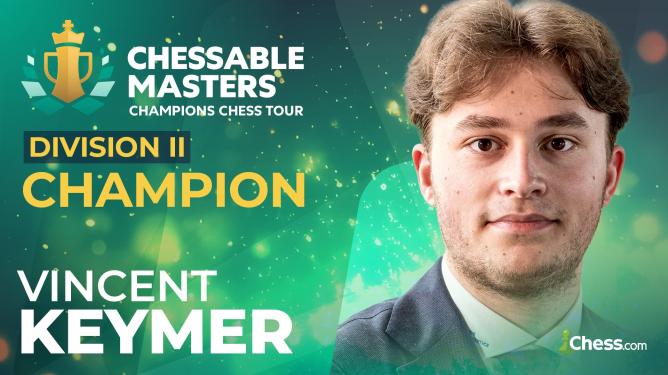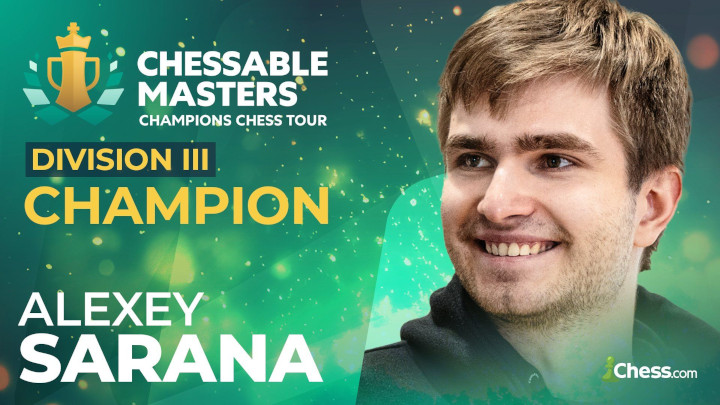.jpeg)

.jpeg)
Vincent Keymer reached the Grand Final of Division II after beating Peter Svidler, Jeffery Xiong, Benjamin Bok and Levon Aronian — four very strong grandmasters — and then had to face Aronian two more times to get overall victory and thus gain a spot in Division I of the next Champions Chess Tour event.
In the first match of the day, Aronian was the first one to score, winning game 2 with the white pieces. Keymer immediately bounced back, and a draw in the fourth encounter led to an Armageddon decider.
Aronian got the black pieces, and won in style, as he got to play a good-looking exchange sacrifice on move 21.
21...Rxf3 is a great practical decision in a blitz game. After the forced sequence 22.gxf3 Ng5 23.f4 Nf3+ 24.Kg2 Nh4+ 25.Kg3 Black counts with 25...Ne4+
The knight check creates a discovered attack along the c-file. Remarkably, though, the position is equal here, as White can play 26.Qxe4, since the black d-pawn is pinned.
The contenders entered a balanced endgame after 26...Nf5+ 27.Kh2 dxe4 28.Rxd7 Rxc1
A brilliant sequence by two in-form elite players! Only later did Keymer falter, as he tried to get something out of nothing, since he needed a win with white to come out on top in the Armageddon. The youngster resigned the game on move 63.
Aronian’s victory gave way to a 2-game Reset, which saw Keymer obtaining back-to-back wins. Interestingly, the German prodigy, playing black, sacrificed an exchange on f3, mimicking his opponent’s idea from the Grand Final sudden-death decider.
18...Rb8 or 18...Na5 are perfectly playable, but Keymer went for 18...Rxf3, perhaps inspired by what had transpired earlier in the day. Much like his young rival in the previous match, Aronian was here forced to win after having lost the first game, so he over-pressed and suffered a second consecutive defeat.

Find all games of Division II at Live.ChessBase.com
Similarly to Keymer, Alexey Sarana’s opponent in the Grand Final of Division III was the same player whom he had defeated in the final of the winners’ bracket — in this case, Alexander Grischuk, who beat Oleksandr Bortnyk to make it to the deciding match.
Another coincidence between the two divisions was that a Grand Final Reset was needed to decide the overall winner. Sarana and Grischuk played nine games between Monday and Tuesday — and, notably, all nine games ended decisively.
Grischuk won the Grand Final by a 3-1 score, while Sarana, like Keymer, grabbed two consecutive wins in the Reset. In the last game of the tournament, Sarana obtained a dominating advantage in a materially balanced position.
Black has just captured a pawn with 56...Nxa5, evening the material on the board. However, White controls the open b-file, his rook is on the seventh rank, and counts with a dangerous passer on the d-file.
Sarana played 57.Re7 here, and patiently converted his clear advantage into a 75-move victory.

Find all games of Division III at Live.ChessBase.com
| Advertising |